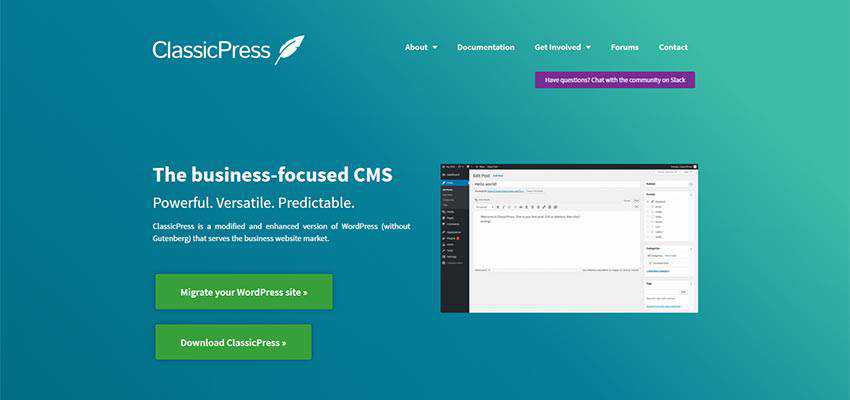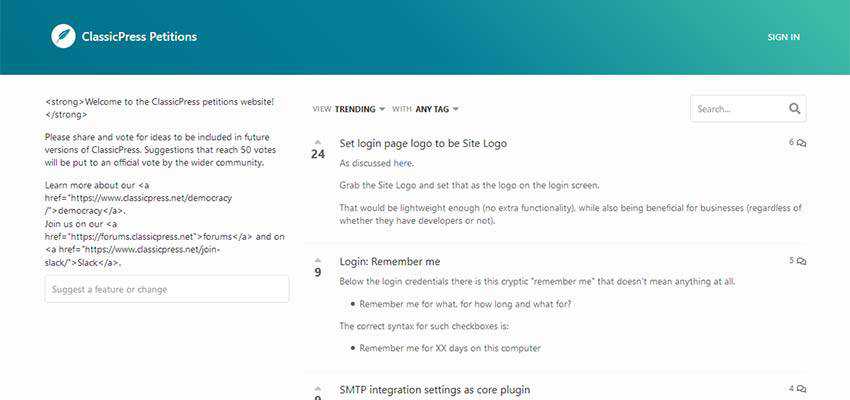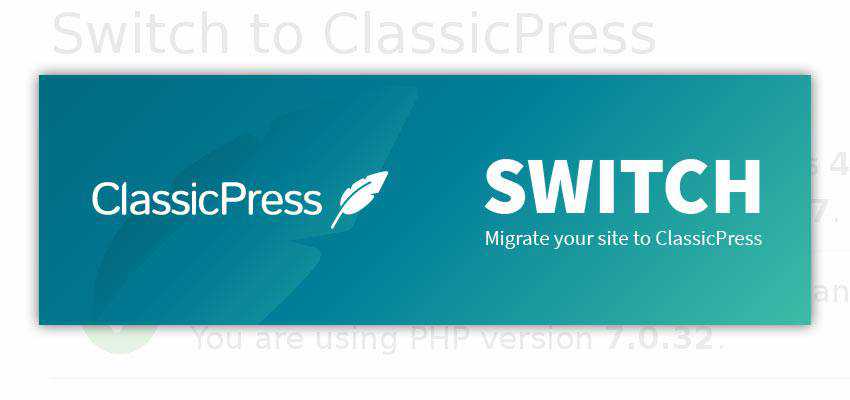Behind the Scenes of ClassicPress – the WordPress Alternative
WordPress 5.0 brought with it a lot of change and controversy. Most of the buzz surrounded the switch to a new block-based editor named Gutenberg. It seemed to have left a lot of people both frustrated and uncertain about the direction of their websites and even their careers. And for some, it prompted action.
Among those who opted to act was developer Scott Bowler. In August 2018, he took it upon himself to create a fork of WordPress – one with the “classic” editor left in place and with a more community driven process for adding core features. Its name: ClassicPress.
The WordPress Toolbox
Unlimited Downloads: 500,000+ WordPress Themes, Plugins, Templates & Design Assets
A Fork in the CMS Superhighway
It’s a big step, for sure. So, what drove such a large undertaking? The reason, according to the project’s marketing co-lead Michelle Coe, “We believe that WordPress wasn’t broken and didn’t need to be fixed by mandating a block editor. We also believe the pre-5.0 WordPress publishing experience was (and still is) a tried and tested solution complimented by a wide array of plugins that extend its functionality.”
Coe says that “By creating the ClassicPress fork, we provided an option for people to continue using the CMS they trust, while also creating an opportunity to create a more robust, business-focused CMS.”
Indeed, the focus of ClassicPress seems to be the business community, where stability and predictability are often preferred. Rather than pushing out large changes (such as Gutenberg) that could hamper users with a steep learning curve and/or potential incompatibilities, Coe says the fork will take what WordPress does well and make it “…leaner, more secure, and more useful.”

Democratic Decision-making
One of the undercurrents of the WordPress 5.0 development process was a perceived lack of communication between project insiders and the community at large. To some, it seemed like user concerns were being pushed aside in favor of directives from the top. Fair or not, it was a common lament.
Beyond the fork’s new name, ClassicPress is aiming to avoid this sort of communication breakdown. Coe says the fact that they are a “community-led” organization gives ClassicPress an advantage, in that they can facilitate “…democratic discussion and decision making via petitions, our forums and other digital communication platforms.”
Further, she notes “Our decentralized organizational structure allows us to adapt to meet the expressed needs of the ClassicPress community, and we make decisions collaboratively with the overall mission of ClassicPress in mind.”
This is certainly a different approach than that of WordPress, which, for better or worse, is at least in some capacity tied to co-founder Matt Mullenweg’s company, Automattic. While Automattic doesn’t run WordPress.org, it does wield some (or, depending on who you ask, a lot of) influence over the direction of the software.
But that top-down structure may have an advantage in terms of decision-making and getting things done. With the more democratic process ClassicPress is employing, one does wonder if that eventually leads to some friendly stalemates.

Making the Switch
Yes, you can take a site originally built with WordPress and covert it over to ClassicPress. In fact, as long as your theme and plugins are compatible with WordPress versions 4.90 up to 5.03, it should work just fine in the forked software.
And, ClassicPress intends to keep that compatibility humming along throughout version 1.x of its CMS. According to a forum post regarding the long-term plans for the software, committee member James Nylen states, “If there are potentially breaking changes in ClassicPress v2.x, we will add a new screen to the upgrade process explaining the changes very clearly and carefully. We will also do as much as possible to automatically confirm that your site can be safely upgraded to the new version.”
As for stability, the software is currently in the release candidate stage of development. Version 1.0 is set to be released in the first half of 2019.

Future Prospects
Creating a fork of an application as mature, intricate and popular as WordPress seemingly would take a large commitment from a lot of people.
Developers have to continue improving the software and fixing bugs. A community of plugin and theme authors have to decide to make their products available and compatible. And users have to jump on board and get behind the project. Therefore, the natural question many have about offshoots like ClassicPress is: Can it survive over the long haul?
For their part, Coe says ClassicPress has a goal of reaching the 1 million user mark by the end of 2020. It sounds like a very ambitious number. However, when you consider that WordPress powers over 33% of all websites, a million users might not be all that far-fetched. In fact, it’s a rather small fraction of the WordPress market share.
When asked about her hopes for the future, Coe states “Ultimately, we want to ensure that those who use ClassicPress find it to be a positive experience that supports them as they focus on their own personal and business goals. We want to be the CMS of choice for business owners around the world.”
Where Do We Go from Here?
It’s clear that some level of dissatisfaction with the direction of WordPress drove developers like Scott Bowler to fork the project or jump to an existing alternative. A key factor in how well something like ClassicPress does is whether that dissatisfaction affects a large enough group of people who are willing to switch.
But with the Classic Editor likely to be around for a while, WordPress isn’t yet backing users into a corner with regards to Gutenberg. Having the option to keep the status quo could convince some users that changing to a new (albeit forked) CMS might not be worth the trouble.
While we don’t know what the future holds, watching it unfold should make for quite an interesting ride.
The post Behind the Scenes of ClassicPress – the WordPress Alternative appeared first on Speckyboy Web Design Magazine.
